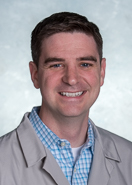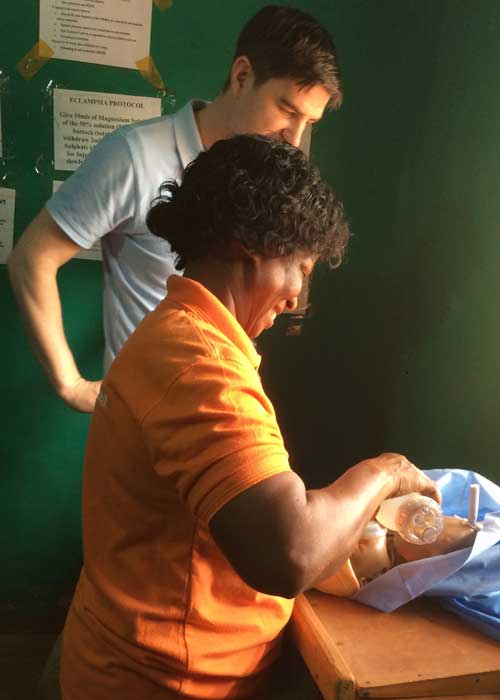
Alumni Spotlight: Matt Pellerite, MD
Nov 12, 2018
Breathing New Life into At-Risk Populations
Matt Pellerite got his first taste of "public health" when he signed up for Xavier's Over-the-Rhine service learning program and moved into the heart of urban poverty in Cincinnati. It was just after the riots of 2001, and Pellerite, a Natural Sciences major, knew that to be a good doctor, he needed to experience how the other half lives.
He spent his volunteer hours at a medical clinic run by a Peruvian doctor, helping treat the mostly Hispanic people who came to the clinic for help. After graduating in 2003, he volunteered for a year with AmeriCorps' City Year program creating health programs for public school children.
Both experiences taught him a valuable lesson—one he carries out today caring for the tiniest patients in Chicago and on mission trips to train midwives in Ghana.
"It affirmed the idea that through medicine, you can actually care for a community and people's needs that are beyond the one-on-one office space," he says. "It was a really neat foundational experience exploring the challenges that people in urban settings have to reach health and health care."
It also introduced him to the idea of public health. "Working in OTR, I realized the impact you can have on a single person and then, I realized there are ways to influence behaviors and outcomes of entire populations."
Pellerite had stumbled onto the concept of population health, which continued to interest him while in medical school at Wright State University. When the school launched a new Master's in Public Health program, he enrolled. It took an extra year, but he graduated in 2009 with two degrees and a personal philosophy about the role of medicine that reflected the values he'd honed at Xavier.
"Anyone with a degree can care for patients," he says. "But it's important that we find a way to value people as they're being cared for, and the idea of caring is more about providing a way to improve their lives."
In Chicago, Pellerite specialized in pediatrics at the University of Chicago. He's now a staff neonatologist with the NorthShore University Health System at Evanston Hospital.
His emphasis on caring for children and the frailest of babies is all part of his focus on helping populations become more healthy. It's a conviction he lives out every day in Chicago. But the chance to help mothers and babies in Ghana was one he could not pass up.
While researching how to train medical residents to care for sick babies, he learned about a program by the American Academy of Pediatrics called Helping Babies Breathe.
One place where the program was being taught was Akyem, Ghana. Pellerite went there in November 2015 for two weeks to study how well the program's resuscitation skills for newborns were retained by about 20 midwives who had taken the Helping Babies Breathe course. Most mothers in Ghana give birth at home and some are lucky to have a midwife available to attend.
"The opportunity in Ghana merged the research I was doing on medical education and my interest in global public health," he says.
He found most of the midwives remembered their training well: first warming and drying the baby with clean rags, stimulating the baby enough to start crying which opens the lungs to breathe. If additional stimulation and dry rubbing does not work, they use a bag-mask to force air into the lungs.
"Where I work there are three people caring for that one baby at delivery, but in Ghana, there is a single midwife caring for both mom and baby," he says. "The stillbirth rate is pretty high because a lot of those babies just don't get enough stimulation to start crying. The initial drive to breathe isn't enough."
What disturbs him is that a lot of babies don't survive because the people don't have the training. "What makes it really unique is you can see no matter where you're born, the challenges of beginning life are exactly the same," he says. "Sometimes babies just need a little jump start."
Pellerite expects to return to Ghana to do more assessments and refresher skill training with the midwives. The reward for him is knowing that this program is providing important knowledge at a basic level, and it's making a difference for babies all over the world.

He's grateful to be involved in spreading that knowledge, and to Xavier for exposing him—through classroom experiences and participation with the Center for Faith and Justice—to the idea of caring for others while building community. Stateside, he lives that commitment as a volunteer member of the Center for Faith and Justice board.
"I can't imagine my place in this world without that Xavier experience," he says. "What makes Xavier a super unique experience is understanding the role of yourself in society. There's a really important place that medicine holds in society, and upholding that responsibility and using that to help people is a privilege and something I'm acutely aware of."